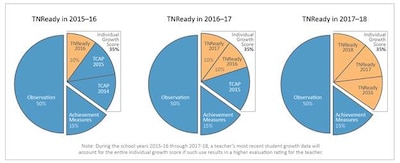A bill from Gov. Bill Haslam’s administration that temporarily would alter the weight of student test scores in Tennessee’s teacher evaluation process passed with no opposition Tuesday in the House Administration and Planning education subcommittee.
The proposed legislation is designed to address educator concerns about the transition to a new assessment next school year and how it will impact evaluation scores for teachers.
This is the last school year in which students take the Tennessee Comprehensive Assessment Program (TCAP) achievement tests before the state switches to its new assessment known as TNReady. Currently, student test scores count for 35 percent of a teacher’s evaluation score through the Tennessee Value Added Assessment System (TVAAS). The bill would provide a phase-in approach so that new state assessment would count only for 10 percent of the teacher evaluation score in 2015-16 and 25 percent in 2016-17. Beginning in 2017-18, the scores would return to counting for 35 percent of the overall evaluation.
State Education Commissioner Candice McQueen told lawmakers the change will help ease the transition to the new assessment, which will bring many changes to the testing process. Unlike TCAP, TNReady is aligned with the Common Core State Standards, can be taken online, and is less reliant on multiple-choice questions.

For teachers of non-tested subjects, the bill proposes that student growth count for 10 percent in 2015-16, down from 25 percent, and move to 15 percent in subsequent school years. This would address teacher concerns that too much weight now is being placed on student growth data for teachers in non-tested grades and subjects.
Rep. Rick Womick (R-Rockvale) expressed concerns that the timetable for transition – while improved under the administration’s proposal – still is too rapid. His amendment to extend the transitional process failed, but not before a teacher from his district spoke to lawmakers about the challenges faced by Tennessee educators.
Emily Mitchell, a first-grade teacher from David Youree Elementary School in Smyrna, pointed out that teachers may be learning about the new assessment next year at the same time they could be learning new standards – should the legislature vote to replace the Common Core State Standards. Either way, the transition will be challenging, she said, and the pace of change in teacher evaluations should reflect that.
“Are we looking at quality or are we looking at speed when it comes to our children’s education?” she asked, holding up a copy of the children’s book The Tortoise and the Hare. “Slow and steady wins the race,” said Mitchell, also president of the Rutherford Education Association.
McQueen told Womick that the administration will propose another bill next year if the new evaluation plan falls short.


